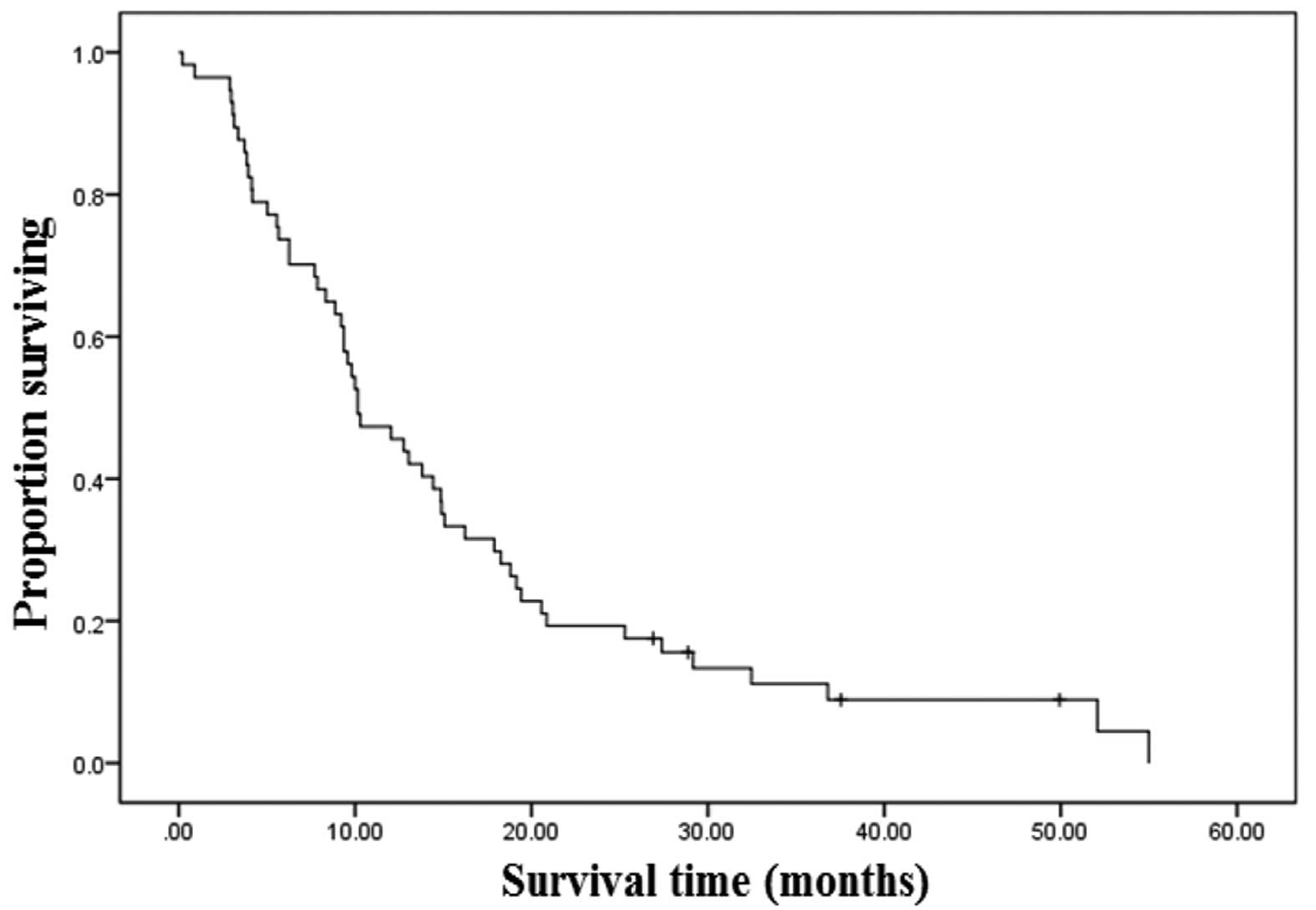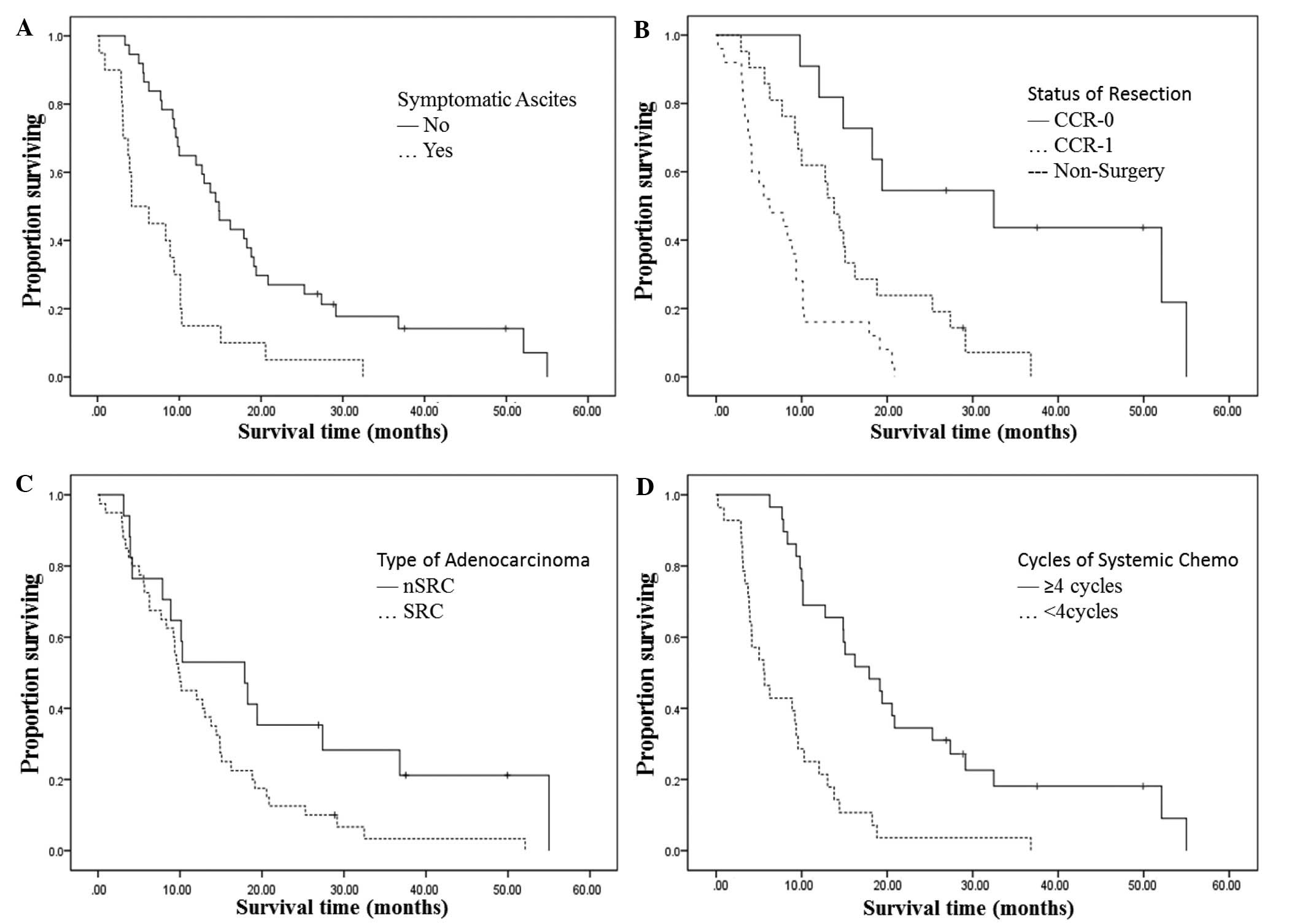|
1
|
Yan TD, Black D, Savady R and Sugarbaker
PH: Systematic review on the efficacy of cytoreductive surgery
combined with perioperative intraperitoneal chemotherapy for
peritoneal carcinomatosis from colorectal carcinoma. J Clin Oncol.
24:4011–4019. 2006. View Article : Google Scholar : PubMed/NCBI
|
|
2
|
Gill RS, Al-Adra DP, Nagendran J, Campbell
S, Shi X, Haase E and Schiller D: Treatment of gastric cancer with
peritoneal carcinomatosis by cytoreductive surgery and HIPEC: A
systematic review of survival, mortality, and morbidity. J Surg
Oncol. 104:692–698. 2011. View Article : Google Scholar : PubMed/NCBI
|
|
3
|
Scaringi S, Kianmanesh R, Sabate JM,
Sabate JM, Facchiano E, Jouet P, Coffin B, Parmentier G, Hay JM,
Flamant Y and Msika S: Advanced gastric cancer with or without
peritoneal carcinomatosis treated with hyperthermic intraperitoneal
chemotherapy: A single western center experience. Eur J Surg Oncol.
34:1246–1252. 2008. View Article : Google Scholar : PubMed/NCBI
|
|
4
|
Chu DZ, Lang NP, Thompson C, Osteen PK and
Westbrook KC: Peritoneal carcinomatosis in nongynecologic
malignancy. A prospective study of prognostic factors. Cancer.
63:364–367. 1989. View Article : Google Scholar : PubMed/NCBI
|
|
5
|
Wagner AD, Grothe W, Haerting J, Kleber G,
Grothey A and Fleig WE: Chemotherapy in advanced gastric cancer: A
systematic review and meta-analysis based on aggregate data. J Clin
Oncol. 24:2903–2909. 2006. View Article : Google Scholar : PubMed/NCBI
|
|
6
|
Cotte E, Colomban O, Guitton J, Tranchand
B, Bakrin N, Gilly FN, Glehen O and Tod M: Population
pharmacokinetics and pharmacodynamics of cisplatinum during
hyperthermic intraperitoneal chemotherapy using a closed abdominal
procedure. J Clin Pharmacol. 51:9–18. 2011. View Article : Google Scholar : PubMed/NCBI
|
|
7
|
Rossi CR, Mocellin S, Pilati P, Foletto M,
Quintieri L, Palatini P and Lise M: Pharmacokinetics of
intraperitoneal cisplatin and doxorubicin. Surg Oncol Clin N Am.
12:781–794. 2003. View Article : Google Scholar : PubMed/NCBI
|
|
8
|
Chua TC, Robertson G, Liauw W, Farrell R,
Yan TD and Morris DL: Intraoperative hyperthermic intraperitoneal
chemotherapy after cytoreductive surgery in ovarian cancer
peritoneal carcinomatosis: Systematic review of current results. J
Cancer Res Clin Oncol. 135:1637–1645. 2009. View Article : Google Scholar : PubMed/NCBI
|
|
9
|
Esquivel J, Elias D, Baratti D, Kusamura S
and Deraco M: Consensus statement on the loco regional treatment of
colorectal cancer with peritoneal dissemination. J Surg Oncol.
98:263–267. 2008. View Article : Google Scholar : PubMed/NCBI
|
|
10
|
Yang XJ, Li Y and Yonemura Y:
Cytoreductive surgery plus hyperthermic intraperitoneal
chemotherapy to treat gastric cancer with ascites and/or peritoneal
carcinomatosis: Results from a Chinese center. J Surg Oncol.
101:457–464. 2010. View Article : Google Scholar : PubMed/NCBI
|
|
11
|
Glehen O, Gilly FN, Arvieux Cotte E,
Boutitie F, Mansvelt B, Bereder JM, Lorimier G, Quenet F and Elias
D: Association Française de Chirurgie: Peritoneal carcinomatosis
from gastric cancer: A multi-institutional study of 159 patients
treated by cytoreductive surgery combined with perioperative
intraperitoneal chemotherapy. Ann Surg Oncol. 17:2370–2377. 2010.
View Article : Google Scholar : PubMed/NCBI
|
|
12
|
Yonemura Y, Kawamura T, Bandou E,
Takahashi S, Sawa T and Matsuki N: Treatment of peritoneal
dissemination from gastric cancer by peritonectomy and
chemohyperthermic peritoneal perfusion. Br J Surg. 92:370–375.
2005. View
Article : Google Scholar : PubMed/NCBI
|
|
13
|
Glehen O, Gilly FN, Boutitie F, Bereder
JM, Quenet F, Sideris L, Mansvelt B, Lorimier G, Msika S and Elias
D: French Surgical Association: Toward curative treatment of
peritoneal carcinomatosis from nonovarian origin by cytoreductive
surgery combined with perioperative intraperitoneal chemotherapy: A
multi-institutional study of 1,290 patients. Cancer. 116:5608–5618.
2010. View Article : Google Scholar : PubMed/NCBI
|
|
14
|
Shen P, Hawksworth J, Lovato J, Loggie BW,
Geisinger KR, Fleming RA and Levine EA: Cytoreductive surgery and
intraperitoneal hyperthermic chemotherapy with mitomycin C for
peritoneal carcinomatosis from nonappendiceal colorectal carcinoma.
Ann Surg Oncol. 11:178–186. 2004. View Article : Google Scholar : PubMed/NCBI
|
|
15
|
Oken MM, Creech RH, Tormey DC, Horton J,
Davis TE, McFadden ET and Carbone PP: Toxicity and response
criteria of the Eastern Cooperative Oncology Group. Am J Clin
Oncol. 5:649–655. 1982. View Article : Google Scholar : PubMed/NCBI
|
|
16
|
Jemal A, Bray F, Center MM, Ferlay J, Ward
E and Forman D: Global cancer statistics. CA Cancer J Clin.
61:69–90. 2011. View Article : Google Scholar : PubMed/NCBI
|
|
17
|
Yoo CH, Noh SH, Shin DW, Choi SH and Min
JS: Recurrence following curative resection for gastric carcinoma.
Br J Surg. 87:236–242. 2000. View Article : Google Scholar : PubMed/NCBI
|
|
18
|
Cashin PH, Graf W, Nygren P and Mahteme H:
Intraoperative hyperthermic versus postoperative normothermic
intraperitoneal chemotherapy for colonic peritoneal carcinomatosis:
A case-control study. Ann Oncol. 23:647–652. 2012. View Article : Google Scholar : PubMed/NCBI
|
|
19
|
Cavaliere F, De Simone M, Virzi S, Deraco
M, Rossi CR, Garofalo A, Di Filippo F, Giannarelli D, Vaira M, et
al: Prognostic factors and oncologic outcome in 146 patients with
colorectal peritoneal carcinomatosis treated with cytoreductive
surgery combined with hyperthermic intraperitoneal chemotherapy:
Italian multicenter study S.I.T.I.L.O. Eur J Surg Oncol.
37:148–154. 2011. View Article : Google Scholar : PubMed/NCBI
|
|
20
|
Shen P, Levine EA, Hall J, Case D, Russell
G, Fleming R, McQuellon R, Geisinger KR and Loggie BW: Factors
predicting survival after intraperitoneal hyperthermic chemotherapy
with mitomycin C after cytoreductive surgery for patients with
peritoneal carcinomatosis. Arch Surg. 138:26–33. 2003. View Article : Google Scholar : PubMed/NCBI
|
|
21
|
Cao C, Yan TD, Black D and Morris DL: A
systematic review and meta-analysis of cytoreductive surgery with
perioperative intraperitoneal chemotherapy for peritoneal
carcinomatosis of colorectal origin. Ann Surg Oncol. 16:2152–2165.
2009. View Article : Google Scholar : PubMed/NCBI
|
|
22
|
Kunisaki C, Shimada H, Nomura M, Matsuda
G, Otsuka Y and Akiyama H: Therapeutic strategy for signet ring
cell carcinoma of the stomach. Br J Surg. 91:1319–1324. 2004.
View Article : Google Scholar : PubMed/NCBI
|
|
23
|
Otsuji E, Yamaguchi T, Sawai K and
Takahashi T: Characterization of signet ring cell carcinoma of the
stomach. J Surg Oncol. 67:216–220. 1998. View Article : Google Scholar : PubMed/NCBI
|
|
24
|
Kim DY, Park YK, Joo JK, Ryu SY, Kim YJ,
Kim SK and Lee JH: Clinicopathological characteristics of signet
ring cell carcinoma of the stomach. ANZ J Surg. 74:1060–1064. 2004.
View Article : Google Scholar : PubMed/NCBI
|
|
25
|
Chu PG and Weiss LM: Immunohistochemical
characterization of signet-ring cell carcinomas of the stomach,
breast, and colon. Am J Clin Pathol. 121:884–892. 2004. View Article : Google Scholar : PubMed/NCBI
|
|
26
|
Nakatsuru S, Yanagisawa A, Ichii S, Tahara
E, Kato Y, Nakamura Y and Horii A: Somatic mutation of the APC gene
in gastric cancer: Frequent mutations in very well differentiated
adenocarcinoma and signet-ring cell carcinoma. Hum Mol Genet.
1:559–563. 1992. View Article : Google Scholar : PubMed/NCBI
|
|
27
|
Hall JJ, Loggie BW, Shen P, Beamer S,
Douglas Case L, McQuellon R, Geisinger KR and Levine EA:
Cytoreductive surgery with intraperitoneal hyperthermic
chemotherapy for advanced gastric cancer. J Gastrointest Surg.
8:454–463. 2004. View Article : Google Scholar : PubMed/NCBI
|
|
28
|
Loggie BW, Fleming RA, McQuellon RP,
Russell GB and Geisinger KR: Cytoreductive surgery with
intraperitoneal hyperthermic chemotherapy for disseminated
peritoneal cancer of gastrointestinal origin. Am Surg. 66:561–568.
2000.PubMed/NCBI
|
|
29
|
Facchiano E, Scaringi S, Kianmanesh R,
Sabate JM, Castel B, Flamant Y, Coffin B and Msika S: Laparoscopic
hyperthermic intraperitoneal chemotherapy (HIPEC) for the treatment
of malignant ascites secondary to unresectable peritoneal
carcinomatosis from advanced gastric cancer. Eur J Surg Oncol.
34:154–158. 2008. View Article : Google Scholar : PubMed/NCBI
|
|
30
|
Sayag AC, Gilly FN, Carry PY, Perdrix JP,
Panteix G, Brachet A, Banssillon V and Braillon G: Intraoperative
chemohyperthermia in the management of digestive cancers. A general
review of literature. Oncology. 50:333–337. 1993. View Article : Google Scholar : PubMed/NCBI
|
|
31
|
Gilly F, Carry P, Bracket A, Sayag AC,
Panteix G, Salle B, Bienvenu J, Banssillon V, Burgard G, Manchon M,
et al: Treatment of malignant peritoneal effusion in digestive and
ovarian cancer. Med Oncol Tumor Pharmacother. 9:177–181.
1992.PubMed/NCBI
|
|
32
|
Inokuchi M, Yamashita T, Yamada H, Kojima
K, Ichikawa W, Nihei Z, Kawano T and Sugihara K: Phase I/II study
of S-1 combined with irinotecan for metastatic advanced gastric
cancer. Br J Cancer. 94:1130–1135. 2006. View Article : Google Scholar : PubMed/NCBI
|
|
33
|
Yano M, Shiozaki H, Inoue M, Tamura S,
Doki Y, Yasuda T, Fujiwara Y, Tsujinaka T and Monden M: Neoadjuvant
chemotherapy followed by salvage surgery: Effect on survival of
patients with primary noncurative gastric cancer. World J Surg.
26:1155–1159. 2002. View Article : Google Scholar : PubMed/NCBI
|
















